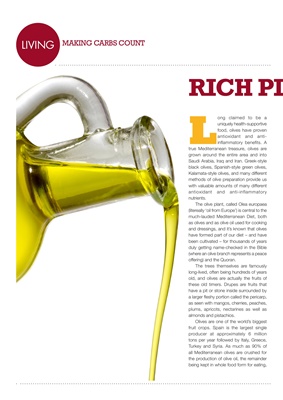
LIVINGLIVING MAKING CARBS COUNT
Long claimed to be a
uniquely health-supportive
food, olives have proven
antioxidant and antiinflammatory benefits.
A
true Mediterranean treasure, olives are
grown around the entire area and into
Saudi Arabia, Iraq and Iran. Greek-style
black olives, Spanish-style green olives,
Kalamata-style olives, and many different
methods of olive preparation provide us
with valuable amounts of many different
antioxidant and anti-inflammatory
nutrients.
The olive plant, called Olea europaea
(litereally 'oil from Europe') is central to the
much-lauded Mediterranean Diet, both
as olives and as olive oil used for cooking
and dressings, and it's known that olives
have formed part of our diet - and have
been cultivated - for thousands of years
duly getting name-checked in the Bible
(where an olive branch represents a peace
offering) and the Quoran.
The trees themselves are famously
long-lived, often being hundreds of years
old, and olives are actually the fruits of
these old timers. Drupes are fruits that
have a pit or stone inside surrounded by
a larger fleshy portion called the pericarp,
as seen with mangos, cherries, peaches,
plums, apricots, nectarines as well as
almonds and pistachios.
One of the world's biggest fruit crops,
Spain is the largest single producer of
olives at approximately 6 million tons
per year followed by Italy, Greece,
Turkey and Syria. As much as 90% of
all Mediterranean olives are crushed for
the production of olive oil, the remainder
being kept in whole food form for eating,
RICH PI